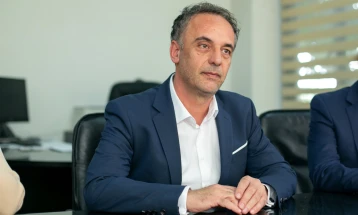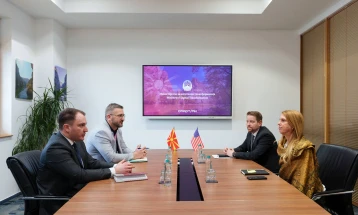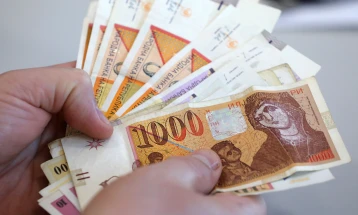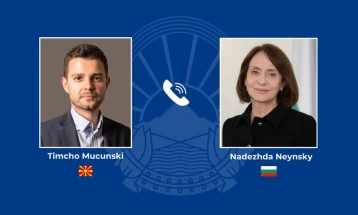Diplomacy still a male-dominated space, women have to do ten times as much to prove themselves: discussion
- The essence of the fight for women’s rights isn’t quotas, but a redefining of the positions of power. A change in politics is needed, we need a politics of empathy, tolerance, understanding and community, concluded panelists at a discussion Monday titled “(Fe)male Effect: Her Story, Her Path, Her Power” hosted at Europe House Skopje on occasion of International Women’s Day – March 8.
- Post By Angel Dimoski
- 15:37, 10 March, 2025
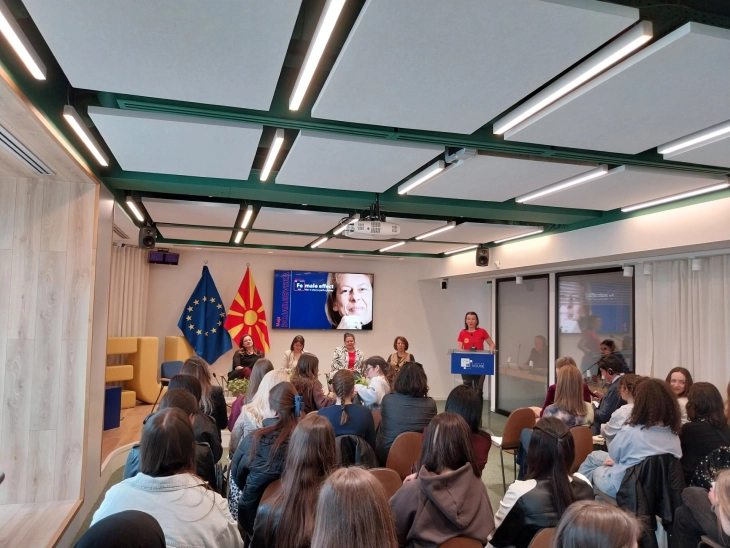
Skopje, 10 March 2025 (MIA) - The essence of the fight for women’s rights isn’t quotas, but a redefining of the positions of power. A change in politics is needed, we need a politics of empathy, tolerance, understanding and community, concluded panelists at a discussion Monday titled “(Fe)male Effect: Her Story, Her Path, Her Power” hosted at Europe House Skopje on occasion of International Women’s Day – March 8.
The Ambassador of the European Union, Michalis Rokas, in his address at the discussion, noted that there is still progress to be made in regard to women’s rights.
“The reality is that regardless of whether we are in the EU or here in North Macedonia or any other place in the world, we aren’t where we need to be yet. Gender inequality continues to be deeply embedded in many societies. As we all know, there are systemic barriers that lead to inequality, such as unequal pay, unequal access to education and insufficient representation in managerial positions,” Ambassador Rokas said.
The Ambassador underlined the need for tangible and concrete action on all levels – institutional, cooperative and individual – since, he said, gender equality makes the world better for everyone.

Maja Bojadzievska, professor at Skopje’s “Blazhe Koneski” Faculty of Philology, in her address at the discussion stressed that women in the country have inherited something that other generations have fought for.
“Is it good to be a woman here? How can it be good to be a woman in an environment that tolerates violence, how can it be good to be a woman in an environment in which the access to medical services for a huge part of the female population is bad? Addiction is nurtured in our society; betting houses are on every corner. Men frequent them, their addiction is encouraged because the betting houses pop up on every corner, while women are enslaved in a painful life. We have inherited without a fight something that others have fought for. We lack a realistic and fair approach to the previous generations who fought for it,” Bojadzievska said.
The Deputy Head of Mission at the Greek Embassy in Skopje, Christina Vasilatou, stressed that the situation with women’s rights in Greece is much better than in the past, but some challenges still persist.

“We had a female president for the first time, but we still haven’t gotten where we need to be. I believe there is a long road ahead of us, especially in diplomacy. It can be said that diplomacy is still a male-dominated space, while women have to do ten times as much to earn their place in the decision-making process,” Vasilatou said.
The Greek diplomat underscored the need for men to change their perspective and understand that inclusive diplomacy is beneficial for the country itself.
“I think Greece is a good place for women, I think my voice is being heard, but I have a responsibility, as a diplomat, to work to raise awareness and provide an example for future generations. To help women engaged in the diplomatic service find their way in this world, which isn’t kind to them and is predominantly male. I faced many stereotypes at the beginning of my career. My advice to young women is that we need to transform our own nature, our tenderness into strength. This is our advantage, to be sensitive and open in other countries that have different positions,” Vasilatou added.
Dragana Stikova, co-founder and head of the Foundation KANTAROT and manager of the “Science for Kids” platform, noted there are no male or female professions, but professions dominated by men and professions dominated by women, underscoring the need to prevent discrimination against women working in male-dominated fields.

“Women are usually more likely to be caregivers, to care for someone, they have a maternal instinct, that’s why they are often teachers, doctors. Perhaps fewer of them are surgeons because it is more of a mechanical job, there isn’t a lot of empathy involved. If you are a general practitioner on the other hand, you are responsible for the patient, you have to establish contact with them. I wouldn’t say that some fields are for women and others aren’t. What I want to say is that in the fields where there are more women than men, in principle men aren’t discriminated against, however in areas where there are more men, such as the natural sciences for example, there are women who are discriminated against. I would focus more on this issue,” Stikova said.
In her address, Margarita Arsova, cultural producer and project manager at the Youth Cultural Center (MKC) in Skopje, spoke about quotas, noting they aren’t a significant part of the essence of the women’s struggle.
“Quotas don’t do a lot for us women unless we redefine the positions of power. If any woman or man enters an already corrupt system, then they become a part of that system. However, if we redefine the system, then we can speak of equal rights and opportunities. We need a change of politics, we need a politics of empathy, tolerance, understanding and community,” Arsova said.
Photo: MIA


